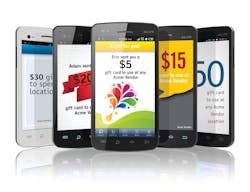Gift cards represent a significant portion of gift giving. In fact, last year total gift card sales exceeded $110 billion, according to the CEB TowerGroup’s annual gift card report. These figures equate to about $950 in gift card sales for every U.S. household. But the days of having to go to a retail establishment to purchase a gift card appear to be winding down as digital gifting is becoming the norm. A recent Alberdeen Group survey found that 21 percent of retailers started offering digital gift cards in the last quarter of 2012. By definition, a digital gift refers to transference of value by electronic (e.g. email, text message or online), not physical media. Of the participating virtual gift retailers, 15 percent offered a digital gift that could be sent to a mobile device. The growth of mobile technology has changed consumers’ preferences about how and when to use gift cards. In particular, consumers are tending to favor virtual gift cards; especially those delivered to a mobile phone via email or text messaging.
The vending pioneer
PepsiCo has created a next generation, interactive social vending machine that enables customers to send drinks to friends via social networking and virtual gifting. The Pepsi ‘Be Social Vending System’ is a state-of-the-art network that features full touchscreen interactive vending technology, thereby enabling consumers to better connect with PepsiCo brands at the point of purchase. Using digital technology, the system enables any user to gift a friend by selecting a beverage and entering the recipient’s name, mobile phone number and a personalized text message. Pepsi also provides an option to personalize the digital gift with a short video of the buyer, recorded right at the machine. Pepsi’s digital gifts are delivered with a system code and instructions for redemption at any compatible vending machine. When the gift is redeemed, the recipient can elect to simply accept the gift, thank the sender with a return digital offering or pay it forward by gifting a beverage to someone else. Additionally, the ‘Be Social Vending System’ allows the purchaser to review Pepsi products’ nutritional data on the vending machine’s interactive touchscreen prior to making the purchase.
Pepsi’s innovative use of telemetry can also deliver operational benefits, including allowing retailers and operators to optimize product inventory and remotely schedule replenishment deliveries, while providing a basis for updating online digital content (e.g. messaging and media content). Digital gifting empowers consumers to simultaneously engage with Pepsi brands and social networking at the point of purchase. This gifting feature provides the technology necessary to change a traditional transaction-oriented sales experience into an interactive and engaging experience. The machine also provides a platform for “Random Acts of Refreshment” wherein a buyer selects a location (e.g. Boston following the marathon bombings) as a symbol of encouragement. The platform also holds potential to extend PepsiCo’s digital and social programs for its food and beverage brands. In essence, the ‘Be Social Vending System’ provides the leverage of emerging technologies to deliver relevant brand experiences through an unattended point of sale.
It is important to note that email addresses and mobile phone numbers are not stored unless expressly permitted by the consumer. PepsiCo does not share contact information with any other partners and standard text message rates apply for the gifting function.
Digital gifting: a profitable future
Why should vending and micro market operators consider digital gifting? Two reasons: one, convenience – the ease of being able to buy and send a gift to anyone, anywhere and anytime; and two, personalization – the ability to make the gifting experience as special, memorable and personal as possible. In addition, digital gifting is rapidly emerging and progressive hospitality providers, such as vending operators, need to have an offering, or guests will shop elsewhere. As a matter of record, digital gifting purchasers tend to be technologically savvy and a weak offering will detract from the organization’s brand identity and may even restrict sales and future opportunities. From an ongoing business standpoint, emerging channels are important to monitor and test. Perhaps a robust online offering would be a wise first step. Anyone offering this service needs to remain mindful of the potential for virtual gifting fraud and implement strong risk mitigation and transaction security processes. Management would be wise to consider digital gifting as a platform, not a single product. Some related consumer m-commerce facts:
- 59 percent interested in using mobile as a form of payment
- 50 percent of U.S. consumers shop with mobile devices
- 61 percent interested in checking balances
- 59 percent interested in organizing and tracking gift cards and loyalty via mobile
- 76 percent want an alternative to carrying everything in their wallets
- 12 percent of mobile U.S. subscribers who receive a text message (SMS) advertisement tend to respond to it quickly; practitioners claim that offers sent via SMS convert 10 to 20 times higher than either email or direct mail deals.
Despite the fact that online gift card purchases have increased from 8 percent in 2008 to 19 percent in 2010 to 33 percent in 2012, Mercator Advisory Group reports that 67 percent of top 100 retailers still do not offer e-gift opportunities.
While digital gifting is still in its infancy in the vending arena, it’s a way operators can think outside the box. Loyalty programs, social gifting and touchscreens are already taking center stage as opportunities for the new era of vending – digital gifting would enhance the offering
Digital gifting - Hospitality management perspective
-
Enhance guest engagement and experience
-
Stimulate loyalty and redemption by driving guests to Website or property
-
Virtual gifting can create brand differentiation while extending reach
-
Offering multiple options based on mobile and social media activity is beneficial
-
Digital gifting enables the capture of analytic data for sender and receiver
-
Digital gifting simplifies inventory, fulfillment and shipping expenses
-
Mitigating fraud is a major concern
-
Digital gifting minimizes the firm’s carbon footprint
About the Author

Michael Kasavana
Ph.D.
Michael L. Kasavana, Ph.D., is the Emeritus NAMA Endowed Professor in Hospitality Business, The School of Hospitality Business at Michigan State University having retired from MSU after nearly four decades of teaching and research. Kasavana holds CHTP (Certified Hospitality Technology Professional) and NCE5 (NAMA Certified Executive) certifications. He remains an active researcher and consultant, focusing on current and near future developments in hospitality-related technologies including: electronic commerce, self-service applications, property management systems, and transaction processing technology. He has also created a series of instructional materials, industry manuals, and software products.
Dr. Kasavana is engaged in innovative and creative solutions for both attended and unattended points of sale for various aspects of the hospitality industry including online and offline, cash and cashless, contact and contactless, physical and virtual data exchange, location-based services, and interchange and merchant fee based digital media. He has conducted extensive research on the impact of technology on hospitality industry productivity, profitability, and competitive advantage and is credited with coining the phrases “V-Commerce”, “V-Engineering”, “Menu Engineering”, and “Auto-Coursing.”
Dr. Kasavana was named the NAMA Industry Person of the Year in 2011 and is a recipient of the MSU Distinguished Faculty Award. In addition, he was inducted into the HFTP International Technology Hall of Fame and was presented the Distinguished Lifetime Achievements Award from FS/TEC for foodservice technology innovation. He has authored, or co-authored, several books, including the industry best-selling texts Managing Front Office Operations (9th edition) and Managing Technology in the Hospitality Industry (7th edition) and has published more than two hundred articles in academic and trade journals.
Dr. Kasavana earned BS (Hotel, Restaurant and Travel Administration), MBA (Finance), and Ph.D. (Management Information Systems) degrees from the University of Massachusetts - Amherst.
